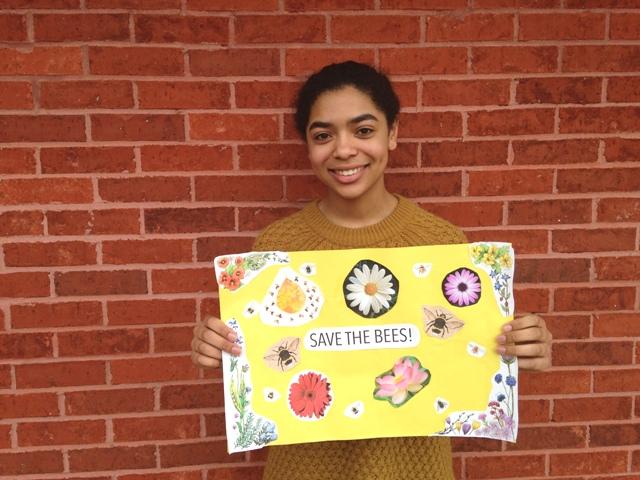Why the Human Race Needs to Help the Bees
Many people take a stance on the controversial debate of whether GMO’s benefits outweigh the harm they inflict by identifying as pro-GMO or pro-organic. Freshman, Leilani Gibbons, provides her evidence to support organic products with the aid of bees. “Bees are an essential part of the environment because they provide for all of life,” Leilani says. “They are debatably the most important species in the circle of life.”
March 11, 2015
With so many animals in the world, it is difficult to comprehend that an entire ecosystem—in fact, a entire world—could be so delicate to dependent upon one taxon of creatures, a group called the pollinators. Pollinators—from butterflies to wasps to hummingbirds—propel the environmental and agricultural health of the ecosystems, though they tend to do all of this without any recognition or gratefulness from those who benefit most: the human race. The pollinators who deserve the most recognition but get the least are the bees. Focusing entirely on the stingers on the ends of their bodies, people oftentimes forget that the huge impact that bees create on an environment. Furthermore, they do not even realize the extent of their importance.
Scientists say that if bees were to disappear from the Earth (through extinction, a threat growing more and more intimidating with each year and each swarm brought to mortality), we as a human race would only live for four years before dying out. The human race depends almost entirely on a species that pollinates 80% of crops worldwide. The effect of living without bees is detrimental, and the result is bleak at best.
This future is possible—which is what makes the increasing death of bees so frightening. Beekeepers and apiculturists have noticed a worldwide increase in the mortality rate of bees. In the United States, the bee population has decreased by 40% since 2006, the bee population in the United Kingdom has decreased by 45% since 2010, and the bee population in Europe has decreased by 25% since 1985. Since the early 90s, beekeepers, apiculturists, and ecologists have been keeping toll of the decreasing populations of bees, and though there have been studies performed and small news stories covered on the topic of inappropriate farming practices, harming the environment and the pollinators within it, there is still miniscule attention drawn to the potentially dangerous situation. Scientists have been searching for the reasons of high honeybee mortality rate, and according to numerous websites dedicated to the acknowledgment of bees’ impact and struggle, multiple difficulties have arisen through both improper agricultural practices and environmental harm inflicted by people.
Since the Green Revolution in the 1970s, genetically modified organisms have become more and more common globally. One can understand why: the economic value of GMOs is undeniable due to the amount of food produced. However, there has been controversy of what ingesting chemicals could do to our bodies. Environmentalists fear what pesticides and herbicides, both of which are common GMOs that protect plants and crops from pests but harm the bees, could do to the soil and to the animals living around the plants. Dave Goulson, a professor of the University of Sussex, has been studying neonicotinoids, a class of insecticides that use chemicals which are able to shut down insects’ central nervous system, resulting in paralysis and death. The insecticides have been wiping out millions of bees, most of which are found dead due to the chemicals are residing inside of their systems. “The reality is if you care about the environment, you should care about this,” Goulson told Washington Post. The chemicals found in GMOs, such as neonicotinoids, are toxic to bees and other pollinators, and the usage of such technology increases the number of bee deaths per year.
The use of GMOs is more common in more developed countries, such as America or England, and the amount of GMO usage directly correlates with the percentages of decline in bee populations. Countries in Europe, such as Austria, France, Greece, Hungary, Germany, Luxembourg, Italy, Spain, and Portugal, many of which are associated with the European Union, have imposed bans on specific kinds of GMOs in order to delegate more organic products for their citizens. Meanwhile, in the United States, it is suspected that 70% of the foods stocked in grocery store shelves contain GMOs.
Bees are the providers for the environment and ecosystems worldwide that perform 70% of the world’s pollination. Humans too could self-pollinate, although the process is laborious, tedious, exhausting, and most importantly expensive. It is estimated that the economic value of bees’ work is $276,825,000. Bees have helped the speck of blue in our massive solar system for centuries; in their time of peril, we as the human race must help them back.
Organizations such as SOS-Bees (which has implemented the Plan Bee program that educates and informs on healthier, safer, and more organic ways to farm), GloryBee (a family-owned honey business that has implemented the Save the Bees campaign), Friends of Earth (which promotes organic farming and ways to save the bees through the Bee Action plan), Greenpeace (an organization involved with SOS-Bees and their own campaign, Bees in Crisis), and Greater Good (which organizes a petition to ban neonicotinoid insecticides and educates on sustainable agriculture) have implemented plans that strive to educate on the importance of bees, the situation that the bees and the human race are in, and how we can fix it.
Bees help us. It is time we return the favor.




